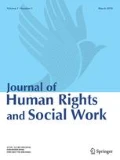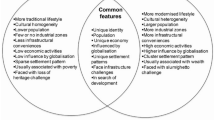Abstract
This paper examined the awareness and compliance with court judgment/constitutional provisions upholding the inheritance rights of Igbo women in Nigeria. The gender inequality theories of Karl Marx and Friedrich Engels guided this study. A mixed-method research design was employed. A sample size of 490 adults was adopted using a pre-tested semi-structured questionnaire for the collection of quantitative data and 25 traditional rulers using in-depth interviews to elicit qualitative data in the five states of South Eastern Nigeria. Quantitative data were analyzed using descriptive statistics and qualitative data were content analyzed. The study showed that the majority of the respondents were not aware of the court judgment of Ukeje vs Ukeje (2014) in favor of female inheritance rights and constitutional provisions upholding inheritance rights. Compliance with court judgment/Nigerian constitution on female inheritance rights was found to be very low. Strong attachment to cultural practices and beliefs, impinging on female inheritance rights, is still held sacrosanct among the Igbo. There is a need for an increased awareness campaign and imposition of a sanction for non-compliance. Awareness campaigns involving the use of songs, proverbs, dance, and drama, among others, composed in the native language to portray this discriminatory cultural practice and the dangers of its continued existence should be encouraged. Such would be an effective means of enforcing and upholding the inheritance rights of women in South Eastern Nigeria. This study investigated, for the first time, the awareness and compliance with court judgment/constitutional provisions upholding the inheritance rights of women among the Igbo, Nigeria.
Similar content being viewed by others
References
Ake, M., Rasak, B., Igbolekwu, C., Ogunlade, P., & Nwozo, A. (2020). Feminization, food security, and hunger eradication: A case of Omu-Aran community in Kwara State, Nigeria. IOP Conference Series: Earth and Environmental Science, 445(1), 012047.
Anyanwu, I. & Anyanwu L. O. (2017). Discriminatory property rights against women in Igbo Nigeria: The victorious case of Ukeje V Ukeje. Journal of Law and Global Policy, 2(1). www.iiardpub.org 2017ISSN 2579–051X
Arisukwu, O., Igbolekwu, C., Adebisi, T., & Akindele, F. (2021). Perception of domestic violence among rural women in Kuje. Heliyon, 7(2), e06303.
Brady, L. M., Kaiser, C. R., Major, B., & Kirby, T. A. (2015). It’s fair for us: Diversity structures cause women to legitimize discrimination. Journal of Experimental Social Psychology, 57, 100–110.
CEDAW. (1979). Convention on the Elimination of all Forms of Discrimination Against Women (art. 5 (a)), adopted by General Assembly resolution 34/180 of 18 December 1979.
Chukwurah, L. N., Malete, L., & Nji, G. C. (2020). Gender inequity in media coverage and athletes’ welfare in Nigerian sports: Impact of the Nigeria sports policy and African union agenda 2063. Sport in Society, 1–12.
Edu, O. K. (2016). A critical analysis of the laws of inheritance in the southern states of Nigeria. Journal of African Law, 60(1), 141–155.
Ejiamike v Ejiamike. (1972). 2 ESLR 11; see also Ngwo and Nwojei v Onyejana (1964) 1 ALL NLR 3326.
Endendijk, J. J., Groeneveld, M. G., & Mesman, J. (2018). The gendered family process model: An integrative framework of gender in the family. Archives of Sexual Behavior, 47(4), 877–904.
Engels, F. (1972). The origin of the family, private property and the state (1884). New York: International.
ESCR-Net. (2018). Mrs Lois ChituruUkeje and Enyinaya Lazarus Ukeje v. Mrs Gladys Ada Ukeje. Supreme Court of Nigeria, SC. 224/2004. https://www.escr-net.org/caselaw/2018/mrs-loischituru-ukeje-and-Enyinaya-Lazarus-ukeje-v-Mrs-Gladys-Ada-ukeje-supreme-court
Ezeilo, J. N. (2021). Rethinking women and customary inheritance in Nigeria. Commonwealth Law Bulletin, 47(4), 706–718.
Guerraoiu, S. (2018). The debate on gender equality in inheritance resurfaces in Morocco. The Arab Weekly.
Hampshire, K. R., & Smith, M. T. (2001). Consanguineous marriage among the Fulani. Human Biology, 73, 597–603.
Heilman, M. E., & Caleo, S. (2018). Gender discrimination in the workplace. In A. J. Colella & E. B. King (Eds.), The Oxford handbook of workplace discrimination (pp. 73–88). Oxford University Press.
Ibrahim, N., & Abdalla, M. (2010). A critical examination of Qur’an 4: 34 and its relevance to intimate partner violence in Muslim families. Journal of Muslim Mental Health, 5(3), 327–349.
Ifemeje, S. C., & Umejiaku, N. (2014). Discriminatory cultural practices and women’s rights among the Igbos of South-East Nigeria: A critique. Journal of Law, Policy and Globalization, 25, 18–27.
Igbolekwu, C. O., Arusukwu, O., Nwogu, J. N., Rasak, B., Asamu, F., & Osueke, N. O. (2021). Domestic violence against women in the Nigerian rural context. Journal of International Women’s Studies, 22(1), 226–245.
International Centre for Research on Women (ICRW). (2006). Property ownership and inheritance rights of women for social protection– The South Asia experience. ICRW Synthesis report of three studies 30th Anniversary.
Iroanusi Q. E. (2022). Nigeria’s parliament fails to break bias, frustrates moves for gender equality, affirmative action. https://www.premiumtimesng.com/news/#IWD2022
Klingorova, K., & Havlíček, T. (2015). Religion and gender inequality: The status of women in the societies of world Religions. Moravian Geographical Reports, 23(2), 2–11.
Nezianya v. Okagbue. (1963). 1All NLR 352.
Nwoko, K. C. (2012). Female Husbands in Igbo Land: Southeast Nigeria. The Journal of Pan African Studies, 5(1), 69–82.
Nzegwu, N. U. (2012). Family matters: Feminist concepts in African philosophy of culture. Suny Press.
Obafemi, K. A. R. (2017). Medical negligence litigation in Nigeria: Identifying the challenges and proposing a model law reform act (Doctoral dissertation, Trinity College Dublin).
Obeid, N., Chang, D. F., & Ginges, J. (2010). Beliefs about wife beating: An exploratory study with Lebanese students. Violence against Women, 16(6), 691–712.
Okigbo, D. (2015). Understanding the Igbo family life and structure. Obindigbo, 23, 10–47.
Oni, B. A. (2014). Discriminatory property inheritance rights under the Yoruba and Igbo customary law in Nigeria: The need for reforms. IOSR Journal of Humanities and Social Science, 19(2), 30–43.
Onu, B. (2008). The right of women to inheritance under Nigeria law: An evaluation. Nigerian Journal of African Law, 2, 40.
Oriaghan, I. (2018). A quick look at women’s land and inheritance rights in Nigeria. Washington, DC: Landesa, Hilton Prize Coalition.
Orisadare, M. A. (2019). An assessment of the role of women group in women political participation, and economic development in Nigeria. Frontiers in Sociology, 4, 52.
Patel, R. (2006). Hindu women’s property rights in India: a critical appraisal. Third World Quarterly, 27(7), 1255–1268.
Paz, M. (2013). The failed promise of language rights: A critique of the international language rights regime. Harvard International Law Journal, 54, 157.
Richardson, A. M. (2004). Women’s inheritance rights in Africa: The need to integrate cultural understanding and legal reform. Human Rights Brief, 11(2), 6.
Silas, S. T. (2017). An evaluation of the cultural practices and women’s inheritance rights in Iboland, Eastern Nigeria: A theologicalethical study. [Unpublished Potchefstroom Campus Doctoral dissertation]. North-West University (South Africa).
Sipe, S. R., Larson, L., Mckay, B. A., & Moss, J. (2016). Taking off the blinders: A comparative study of university students’ changing perceptions of gender discrimination in the workplace from 2006 to 2013. Academy of Management Learning & Education, 15(2), 232–249.
Suleiman, M. Y., & Amuda-Kannike, A. (2019). Some religio-cultural practices against the property rights of women and children in Nigeria and specified African countries. Nnamdi Azikiwe University Journal of International Law and Jurisprudence, 10(1), 166–175.
Uchendu, O. J., Ijomone, E. A., & Nwachokor, N. F. (2019). Suicide in Warri, Delta State, Nigeria: An autopsy study. Annals of Tropical Pathology, 10(1), 16.
Ukeje v Ukeje. (2014). LPELR – 22724 (SC) Electronic Law Reports also dealt with one outstanding debate, the rights of children born out of wedlock. On this, see further Chinwuba (2015) Afr. Charter, Art. 61 Afr. Charter, Art. 10; American Convention, Art. 16(1); European Convention, Art. 11(2).
Union, A. (1981). The African charter on human and people’s rights, 2003. African Charter on Democracy, Elections and Governance.
United Nations (UN). (1948). Universal declaration of human rights. https://www.un.org/en/about-us/universal-declaration-of-humanrights
United States. President (1945-1953: Truman). (1945). The Charter of the United Nations with the Statute of the International Court of Justice Annexed Thereto: Address by the President of the United States Delivered Before the Senate on July 2, 1945 Presenting the Charter of the United Nations, with the Statute of the International Court of Justice Annexed Thereto: and a Message from the President of the United States Transmitting a Certified Copy of the Charter of the United Nations, with the Statute of the International Court of Justice Annexed Thereto .... US Government Printing Office.
Funding
We appreciate Landmark University for accepting to pay for this publication.
Author information
Authors and Affiliations
Corresponding author
Ethics declarations
Conflict of Interest
The authors declare no competing interests.
Additional information
Publisher's Note
Springer Nature remains neutral with regard to jurisdictional claims in published maps and institutional affiliations.
Rights and permissions
About this article
Cite this article
Igbolekwu, C.O., Nwogu, J.N., Arisukwu, O.C. et al. Awareness and Compliance with Court Judgment/Constitutional Provisions Legalizing Female Inheritance Rights Among the Igbo, Nigeria. J. Hum. Rights Soc. Work 7, 384–395 (2022). https://doi.org/10.1007/s41134-022-00219-y
Accepted:
Published:
Issue Date:
DOI: https://doi.org/10.1007/s41134-022-00219-y




